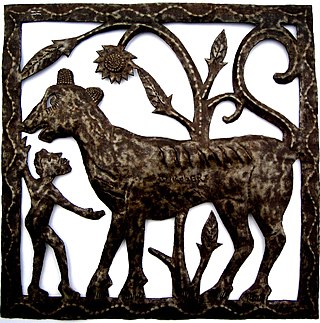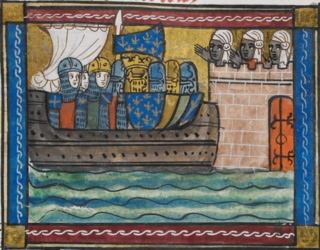Related Research Articles

Humanae vitae is an encyclical written by Pope Paul VI and dated 25 July 1968. The text was issued at a Vatican press conference on 29 July. Subtitled On the Regulation of Birth, it re-affirmed the teaching of the Catholic Church regarding married love, responsible parenthood, and the rejection of artificial contraception. In formulating his teaching he explained why he did not accept the conclusions of the Pontifical Commission on Birth Control established by his predecessor, Pope John XXIII, a commission he himself had expanded.

Theodor Zwinger the Elder was a Swiss physician and Renaissance humanist scholar. He made significant contributions to the emerging genres of reference and travel literature. He was the first distinguished representative of a prominent Basel academic family.

Saracen was a term used both in Greek and Latin writings between the 5th and 15th centuries, to refer to the people who lived in and near what was designated by the Romans as Arabia Petraea and Arabia Deserta. The term's meaning evolved during its history of usage. During the Early Middle Ages, the term came to be associated with the tribes of Arabia.

Uriel da Costa was a Portuguese philosopher who was born a New Christian but returned to Judaism and ended up questioning the Catholic and rabbinic traditions of his time. This led him into conflict with both Christian and rabbinic institutions and caused his books to be included in the Index Librorum Prohibitorum, the List of Prohibited Books by the Catholic Church.
This article contains information about the literary events and publications of the 13th century.
Solomon ibn Gabirol or Solomon ben Judah was an 11th-century Andalusian poet and Jewish philosopher in the Neo-Platonic tradition. He published over a hundred poems, as well as works of biblical exegesis, philosophy, ethics and satire. One source credits ibn Gabirol with creating a golem, possibly female, for household chores.

Joseph Derenbourg, or Joseph Naftali Derenburg was a Franco-German orientalist.
A culture of life describes a way of life based on the belief that human life at all stages from conception through natural death is sacred. It opposes the destruction of human life at any stage, including abortion, euthanasia, capital punishment, studies and medicines involving embryonic stem cells, and contraception. It also promotes policies that "lift up the human spirit with compassion and love." The term originated in moral theology, especially that of the Catholic Church, and was popularly championed by Pope John Paul II; it has been widely used by religious leaders in evangelical Christianity as well. The philosophy of such a culture is a consistent life ethic.
Signs of the times is a phrase strongly associated with the Catholic Church in the era of the Second Vatican Council of the 1960s. It was taken to mean that the church should listen to, and learn from, the world around it. In other words, it should learn to read the 'signs of the times'. This phrase comes from Matthew 16:3, Luke 12:56 and was used by Pope John XXIII [Latin: "signa temporum"] when he convoked the council, in the statement Humanae Salutis (1961) and also in Pacem in Terris (1963). It came to signify a new understanding that the Church needed to attend more closely to the world if it was to remain faithful to its calling, and marked a significant shift in theological method. The phrase "sign of the times" was used four times in the Vatican II documents:
Janet Elizabeth Smith is an American classicist and philosopher, and former professor of moral theology at the Sacred Heart Major Seminary in Detroit, Michigan.
Religious adherents vary widely in their views on birth control. This can be true even between different branches of one faith, as in the case of Judaism and Christianity. Some religious believers find that their own opinions of the use of birth control differ from the beliefs espoused by the leaders of their faith, and many grapple with the ethical dilemma of what is conceived as "correct action" according to their faith, versus personal circumstance, reason, and choice. This article will discuss various views on birth control of the major world religions Christianity, Buddhism, Judaism, Islam, Hinduism, and Baha'i.
Rodrigo Sánchez de Arévalo was a Spanish churchman, historian and political theorist.

The medieval genre of speculum literature, popular from the twelfth through the sixteenth centuries, was inspired by the urge to encompass encyclopedic knowledge within a single work. However, some of these works have a restricted scope and function as instructional manuals. In this sense the encyclopedia and the speculum are similar, but they are not the same genre.

Jean Miélot, also Jehan, was an author, translator, manuscript illuminator, scribe and priest, who served as secretary to Philip the Good, Duke of Burgundy from 1449 to Philip's death in 1467, and then to his son Charles the Bold. He also served as chaplain to Louis of Luxembourg, Count of St. Pol from 1468, after Philip's death. He was mainly employed in the production of de luxe illuminated manuscripts for Philip's library. He translated many works, both religious and secular, from Latin or Italian into French, as well as writing or compiling books himself, and composing verse. Between his own writings and his translations he produced some twenty-two works whilst working for Philip, which were widely disseminated, many being given printed editions in the years after his death, and influenced the development of French prose style.
The theology on the body is a broad term for Catholic teachings on the human body.

The Tiger, the Brahmin and the Jackal is a popular Indian folklore with a long history and many variants. The earliest record of the folklore was included in the Panchatantra, which dates the story between 200 BCE and 300 CE.
The Pontifical Commission on Birth Control was a committee within the Roman Curia tasked with analyzing the modern impact of birth control on the Roman Catholic Church. The disagreements within the commission ultimately led to the publication of the encyclical Humanae vitae.

Daniel Clasen, in Latin Danielis Clasenius or Clasenus, was a German political theorist, religious scholar, and classicist.

The Directorium ad faciendum passagium transmarinum is an anonymous 24,000-word Latin treatise on crusading submitted to King Philip VI of France on 26 July 1330 or 1332. The treatise proposes the conquest of the Holy Land, the Byzantine Empire and Russia and their subjection to the Catholic Church; outlines how this might be achieved; and describes how the conquered territories could be administered.
References
 This article incorporates text from a publication now in the public domain : Singer, Isidore; et al., eds. (1901–1906). "John of Capua". The Jewish Encyclopedia . New York: Funk & Wagnalls.
This article incorporates text from a publication now in the public domain : Singer, Isidore; et al., eds. (1901–1906). "John of Capua". The Jewish Encyclopedia . New York: Funk & Wagnalls.- Brief biography of John of Capua at Jewish Virtual Library